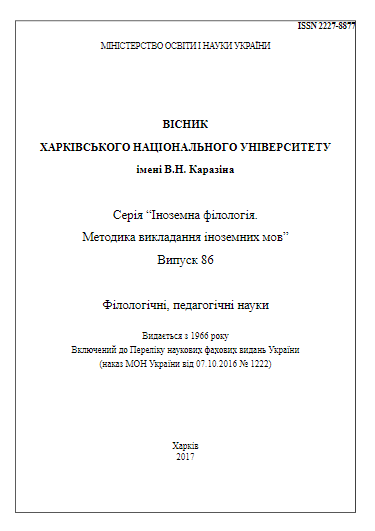Communicative behavior of an idealized man in novels by the British writers: major diachronic changes
Keywords:
communicative strategy, discourse, ideal ma, negative politeness, positive politeness, verbal behavior
Abstract
The article is devoted to presenting the results of the study of the major changes that the verbal behavior of an idealized man underwent in the novels written by the British authors Jane Austen and Helen Fielding. The ideal person as a linguistic personality is a representative of the British society of the corresponding historic period, the beginning of the 19th century and the end of the 20th century, whose positive qualities and benefits are consciously deliberately by the authors and are perceived by readers as perfect. The analysis of the verbal level of the given language identity, i.e. the positive and negative politeness strategies available in his discourse, is carried out. It is established that the leading for the hero of the nineteenth century novels is the strategy of hedging, while the ideal hero of the twentieth century mainly employs the strategy of attending to the interests, desires and needs of his female communication partner. Thus, the study of changes in the communicative behavior priorities makes it possible to reveal the dynamics of the general tendency of perception of the idealized man by the female representatives of the British linguistic and cultural community. The prospect of further research is analyzing all of the politeness strategies available in the discourse of the ideal man which will facilitate creating the most accurate diachronic portrait of the idealized linguistic identity under study.Downloads
Download data is not yet available.
References
Виноградов В.В. Избранные труды : О языке художественной прозы / В.В. Виноградов. – М. : Наука, 1980. – 360 с.
Гумбольдт В. фон. О различии строения человеческих языков и его влиянии на духовное развитие человечества / В. фон Гумбольдт // Избранные труды по языкознанию. [Пер. с нем.], под ред. проф. Г.В. Рамишвили. – М. : Прогресс, 1984. – 297 c.
Довганюк Е.В. Еволюція концепту КРАСА в англомовному дискурсі XIV-XXI століть : автореф. дис. на здобуття наук. ступеня канд. філол. наук : спец. 10.02.04 «Германські мови» / Е.В. Довганюк. – Харків, 2017. – 20 с.
Карасик В.И. Речевое поведение и типы языковых личностей // Массовая культура на рубеже ХХ – ХХI веков: Человек и его дискурс : сб. науч. трудов / Под ред. Ю.А. Сорокина, М.Р. Желтухиной. – М. : Азбуковник, 2003. – 368 с.
Карасик В.И. Языковой круг: Личность, концепты, дискурс / В.И. Карасик. – Волгоград : Перемена, 2002. – 476 с.
Караулов Ю.Н. Русская языковая личность и задачи ее изучения / Ю.Н. Караулов // Язык и личность. – М. : Наука, 1989. – С. 3–8.
Ларина Т.В. Категория вежливости и стиль коммуникации / Т.В. Ларина. − М. : Рукописные памятники Древней Руси, 2009. – 516 с.
Морозова И.И. Коммуникативные стратегии вежливости в стереотипном речевом поведении викторианской женщины : дис. … канд. филол. наук : 10.02.04 / Морозова Ирина Игоревна. − Харьков, 2004. − 208 с.
Черкаська О. Формування мовної і комунікативної компетенції мовної особистості у вищій школі / О. Черкаська // Вища школа. – 2010. – № 12. – С. 63–72.
Шевченко И.С. Дискурс как мыслекоммуникативное образование / И.С. Шевченко, Е.И. Морозова // Вісник ХНУ. – 2003. – № 586. – С. 33–38.
Brown P., Levinson S. Politeness: Some Universals in Language Use / P. Brown, S. Levinson. – L., NY, etc.: CUP, 1987. – 345 p.
Гумбольдт В. фон. О различии строения человеческих языков и его влиянии на духовное развитие человечества / В. фон Гумбольдт // Избранные труды по языкознанию. [Пер. с нем.], под ред. проф. Г.В. Рамишвили. – М. : Прогресс, 1984. – 297 c.
Довганюк Е.В. Еволюція концепту КРАСА в англомовному дискурсі XIV-XXI століть : автореф. дис. на здобуття наук. ступеня канд. філол. наук : спец. 10.02.04 «Германські мови» / Е.В. Довганюк. – Харків, 2017. – 20 с.
Карасик В.И. Речевое поведение и типы языковых личностей // Массовая культура на рубеже ХХ – ХХI веков: Человек и его дискурс : сб. науч. трудов / Под ред. Ю.А. Сорокина, М.Р. Желтухиной. – М. : Азбуковник, 2003. – 368 с.
Карасик В.И. Языковой круг: Личность, концепты, дискурс / В.И. Карасик. – Волгоград : Перемена, 2002. – 476 с.
Караулов Ю.Н. Русская языковая личность и задачи ее изучения / Ю.Н. Караулов // Язык и личность. – М. : Наука, 1989. – С. 3–8.
Ларина Т.В. Категория вежливости и стиль коммуникации / Т.В. Ларина. − М. : Рукописные памятники Древней Руси, 2009. – 516 с.
Морозова И.И. Коммуникативные стратегии вежливости в стереотипном речевом поведении викторианской женщины : дис. … канд. филол. наук : 10.02.04 / Морозова Ирина Игоревна. − Харьков, 2004. − 208 с.
Черкаська О. Формування мовної і комунікативної компетенції мовної особистості у вищій школі / О. Черкаська // Вища школа. – 2010. – № 12. – С. 63–72.
Шевченко И.С. Дискурс как мыслекоммуникативное образование / И.С. Шевченко, Е.И. Морозова // Вісник ХНУ. – 2003. – № 586. – С. 33–38.
Brown P., Levinson S. Politeness: Some Universals in Language Use / P. Brown, S. Levinson. – L., NY, etc.: CUP, 1987. – 345 p.
Published
2018-03-12
How to Cite
Гужва, О. О. (2018). Communicative behavior of an idealized man in novels by the British writers: major diachronic changes. The Journal of V.N. Karazin Kharkiv National University. Series: Foreign Philology. Methods of Foreign Language Teaching, (86), 41-47. https://doi.org/10.26565/2227-8877-2017-86-05
Section
Discoursology: semantics and pragmatics




